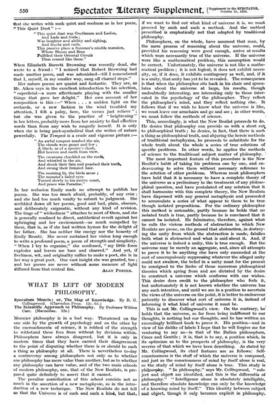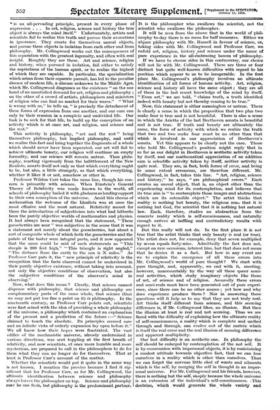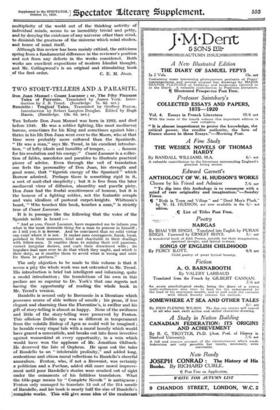WHAT IS LEFT OF MODERN PHILOSOPHY.
Speculum Menus; or, The Map of Knowledge. By R. G. Collingwood. (Clarendon Press. 12s. 6d.) The Scientific Approach to Philosophy. By Professor Wildon Carr. (Macmillan. 12s.) *MODERN philosophy is in a bad way. Threatened on the one side by the growth of psychology and on the other by the encroachments of science, it is robbed of the strength to withstand these foes from without by divisions within.
Philosophers have always disagreed, but it is only -in modern times that they have carried their disagreement
to the point of disputing whether there is or should be such a thing as philosophy at all. There is nevertheless to-day a controversy among philosophers not only as to whether
one philosophy has more value than another, but as to whether any philosophy can have value, and of the two main schools
of modern philosophy, one, that of the New Realists, is pre- pared quite definitely to assert that it cannot.
The peculiar contribution of this school consists not so much in the assertion of a new metaphysic, as in the intro- duction of a new technique. The New Realists do not tell
us that the Universe is of such and such a kind, but that, if we want to find out what kind of universe it is, we must proceed by such and such a method. And the method prescribed is emphatically not that adopted by traditional philosophy.
Philosophers, on the whole, have assumed that man, by the mere process of reasoning about the universe, could, provided his reasoning were good enough, arrive at results which were necessarily true of the universe. If the universe were like a mathematical problem, this assumption would be correct. Unfortunately, the universe is not like a mathe- matical problem ; it is not logical, it does not exhibit neces- sity, or; if it does, it exhibits contingency as well, and, if it is a unity, that unity has yet to be revealed. The consequence
is that when the philosopher .sits back in. his chair and specu- lates about the universe at large, his results, though undoubtedly interesting, are interesting Only to those inter- ested in the psychology of the philosopher. They reflect the philosopher's mind, and they reflect nothing else. It follows that if we wish to know what the universe is like, we must leave our armchairs and go and see ; in other words, we must follow the methods of science.
This, accordingly, is what the New Realist proceeds to do. He denies that philosophy can provide us with a short cut, to philosophical truth ; he denies, in fact, that there is such a thing as philosophical truth, and abjuring the heroic methods of traditional metaphysics, he proceeds to substitute for the whole truth about the whole a series of true solutions of specific problems. In other words, he applies the methods, of science to the traditional subject matter of philosophy.
The most important feature of this procedure is the New Realist's habit of taking his problems one by one, and en- deavouring to solve them without necessary reference to
the 90Iufion of other problems. Whereas most philosophers have held that it is necessary to have a complete theory of
the universe as a preliminary to the treatment of any philoso- phical question, and have postulated of any solution that it shall harmonize with this complete theory, the New Realists have dispensed with any general metaphysic and proceeded to accumulate a series of what appear to them to be true though isolated propositions. For the ordinary philosopher this method is untenable, partly- because he holds that no isolated truth is true, partly because he is convinced that it cannot be isolated. He fulminates, therefore, against what he calls the vicious methods of abstraction to which New Realists are prone, on the ground that abstraction, in destroy- ing the unity from which the abstraction is made, falsifies both what is abstracted and what is said about it. And, if the universe is indeed a unity, this is true enough. But the. universe may be merely an aggregate, and, since all attempts to prove it to be anything else have only succeeded at the cost of unscrupulously suppressing whatever the alleged unity could not swallow, "the belief in a unity must for the present be consigned to the limbo of those numerous philosophical theories which spring from and are dictated by the desire to construct a universe which conforms with our wishes..
This desire does credit to the philosopher who feels it, but unfortunately it is not known whether the universe has any such intention, and until we are in a position to ascertain the views of the universe on the point, it is better to endeavour patiently to discover what sort of universe it is, instead of informing it what kind of universe it must be.
This is not Mr. Collingwoed's view. On the contrary, he holds that the universe, so far from being indifferent to our thoughts, is nothing but our thoughts, and he has written an exceedingly brilliant book to prove it. His position—and in view of his dislike of labels I hope that he will forgive me for venturing to say so—is that of the Italian philosophers, Croce and Gentile ; it is, that is to say, a position which, in its optimism as to the prospects of philosophy, is the very reverse of that which we have been describing. As stated by Mr. Collingwood, its chief features are as follows: Self- consciousness is the stuff of which the universe is composed, and just as the consciousness of mind by itself alone is real, so the study of mind by itself alone is true. This study is philosophy. "In philosophy," says Mr. Collingwood, "sub- ject and object are identified, and this is the differentia of philosophy." "Intelligence alone is absolutely intelligible, and therefore absolute knowledge can only be the knowledge
of a knowing mind by itself." This identity between subject and object, though it only. becomes explicit in, philosophy,
is an all-pervading principle, present in every phase of expression . . . In art, religion, science and history the true object is always the mind itself." Unfortunately, artists and scientists fail to realize this truth and pursue their avocations in ignorance. They create for themselves unreal objects, and pursue these objects in isolation from each other and from philosophy. Mr. Collingwood works out the consequences of
this separation -with the greatest ingenuity, and often with real insight. Roughly they are these. Art and science, religion and history, when pursued in isolation, fail either to satisfy the aspirations of the human spirit, or to realize the highest of which they are capable. In particular, the specialization which arises from their separate pursuit, has led to the peculiar disease of modem life, a. disease unknown to the Middle Ages, which Mr. Collingwood diagnoses as the existence" on the one hand of an unsatisfied demand for art, religion and philosophy ; on the other of a crowd otartists, philosophers and ministers of religion who can find no market for their wares." "What is wrong with us," he tells us„ "is precisely the detachment of these forms of expression from one another, and our cure can only be their reunion in a complete and undivided life. Our task is to seek for that life, to build up the conception of an activity which is at once art, and religion, and science and the rest."
This activity is philosophy, "art and the rest" being themselves philosophy, but implied philosophy, and until we realize this fact and bring together the fragments of a whole which should never have been separated, our art will fail to achieve ultimate beauty-, our religion will continue an empty formality, and our science will remain untrue. Thus philo- sophy, reacting vigorously from the belittlement of the New Realists, asserts itself not only as that which everything ought to be, but also, a little stiangely, as that which everything, whether it likes it or not, somehow or other is.
Professor Wildon Carr takes the same line, though his con- cern is primarily with science. When Einstein's General Theory of Relativity -was made known to the -world, all schools of philosophy hailed it with gladness as lending support to their own conception of the universe. Amid this chorus of acclamation the welcome of the Idealists was at once the most effusive and the most natural. Relativity meant for them the introduction of subjectivism into what had hitherto been the purely objective worlds of mathematics and physics. It had always been recognized that the statement, "These gooseberries are sour" was subjective in the sense that it was a. statement not merely about the gooseberries, but about a sort of composite whole of which both the gooseberries and the palate of the taster were integral parts, and it now appeared that the same could• be said of such statements as "This steeple is 200 feet high," " This triangle is right angled," "The distance from the earth to the sun is X miles." As Professor Carr puts it, the "new principle of relativity is the recognition that the facts observed cannot be understood in their purely objective existence, without taking into account, not only the objective conditions of observation, but also the subjective conditions of the observer's mind in observing."
Now, what does this mean ? Clearly, that science cannot dispense with philosophy, that science and philosophy are complementary parts of the same whole, that science (that
we may not put too fine a point on it) is philosophy. In the nineteenth century, as Professor Carr points out, scientists
were first seized with the idea of providing a whole philosophy of the universe, a philosophy which contained an explanation of the present and a prediction of the future :—" Science claimed to touch the absolute. Its principles seemed sure and an infinite vista of orderly expansion lay open before it." We all know how their hopes were frustrated. The vast edifice of the mechanistic universe, already undermined in various directions, was sent toppling at the first breath of relativity, and now scientists, at once more humble and more mysterious, are prepared to call in the philosophers to do for them what they can no longer do for themselves. That at least is Professor Cam's account of the matter.
Whether the scientists would put it quite in the same way is not known. I mention the proviso because I find it sig- nificant that for Professor Carr, as for Mr. Collingwood, the ultimate identification between science and philosophy always leaves the philosopher on top. Science and philosophy may be one flesh, but philosophy is the predominant partner. It is the philosopher who swallows the scientist, not the scientist who swallows the philosopher.
It will be seen from the above that in the world of phil- osophy -to-day there is no room for half measures. Either we
abjure philosophy with Mr. Russell in favour of science, or, taking sides with Mr. Collingwood and Professor Carr, we enfold art, religion, history and science under the name of pure experience in the all-embracing bosom of philosophy.
If we have to choose sides in this controversy, our choice will not lie with Mr. Collingwood. There are three or four distinct but quite well-known difficulties with regard to his position which appear to us to be insuperable. In the first place Mr. Collingwood's philosophy involves an ultimate identification of all forms of human activity. Art, religion, science and history all have the same object ; they are all of them in the last resort knowledge of the mind by itself. "Even art," we are told, "claims truth, a truth identified indeed with beauty but not thereby ceasing to be true."
Now, this statement is either meaningless or untrue. There is clearly a sense in which the proposition that two plus two make four-is true and is not beautiful. There is also a-sense in which the Arietta of the last Beethoven sonata is beautiful and is not true. If truth and beauty are ultimately the same, the form of activity with which we realize the truth that two and two make four must be no other than that which is involved in our appreciation of Beethoven's sonata. Yet this appears to be clearly not the case. Those who hold Mr. Collingwood's position might reply that in so far as our delight in Beethoven is aesthetic activity taken by itself, and our mathematical appreciation of an addition sum is scientific activity taken by itself, neither activity is quite real. They are, in fact, both forms of error, and being to some extent erroneous, are therefore different-L. Mr. Collingwood, in fact, takes this line. "Art, religion, science and history," he says, "are philosophical errors." Each creates an unreal object, that is, an object other than the experiencing mind for its contemplation, and believes that its true aim is" to contemplate those images and abstractions which are its ostensible object." The artist thinks that reality is nothing but beauty, the religious mai,. that it is nothing but God, the scientist that it is nothing but natural law. Each, therefore, studies an abstraction from the concrete reality which is self-consciousness, and naturally enough arrives at baffling and contradictory results with regard to it.
But this really will not do. In the first place it is net true that the artist thinks that only beauty is real (or true). The artist does not, for example, deny that seven multiplied by seven equals forty-nine. Admittedly the fact does not, except on rare occasions, interest him, but that does not mean that he denies it as a fact. But how in• any event are we to explain the emergence of all these errors into Mr. Collingwood's world of pure thought? We start with pure thought, and, apparently, we end with it., meeting, however, unaccountably by the way -all these queer semi- real activities, which study imaginary objects like those of art, of science and of religion. Assuredly these errors and semi-reals must have been generated out of pure experi- ence, since there can be no other source ; yet how and why does experience produce them ? Nor in answering these questions will it help us to say that they are not truly real. Art thinks itself- different from science, and this seeming difference is if Mr. Collingwood likes, an illusion. But then the illusion at least is real and not seeming. Thus we are faced -with the difficulty of explaining how the ultimate reality of self-consciousness, a reality which is complete and unified through and through, can evolve, out of the matrix which is itself the real error and the real illusion of seeming difference and apparent multiplicity.
Our last difficulty is an aesthetic one. In philosophy the self should be enlarged by contemplation of the not self. It is by communion with impersonal objects, it is by maintaining a modest attitude towards objective fact, that we can lose ourselves in a reality which is other than ourselves. Thus we can forget the nervous little clod of wants and ailments which is the self, by merging the self in thought in an imper- sonal universe. For Mr. Collingwood and his friends, however, -there is nothing but the self, simply bemuse the whole universe is an extension of the individual's self-consciousness. . This doctrine, which would generate the whole variety and
multiplicity of the world out of the thinking activity of individual minds, seems to us incredibly trivial and petty, and. by denying the existence of any universe other than mind, to diminish the greatness of the universe which mind studies, and hence of mind itself.
Although this review has been mainly critical, the criticisms spring from a fundamental difference in the reviewer's position and not from any defects in the works considered. Both works are excellent expositions of modern Idealist thought, and Mr. Collingwood's is an original and stimulating book




























































 Previous page
Previous page